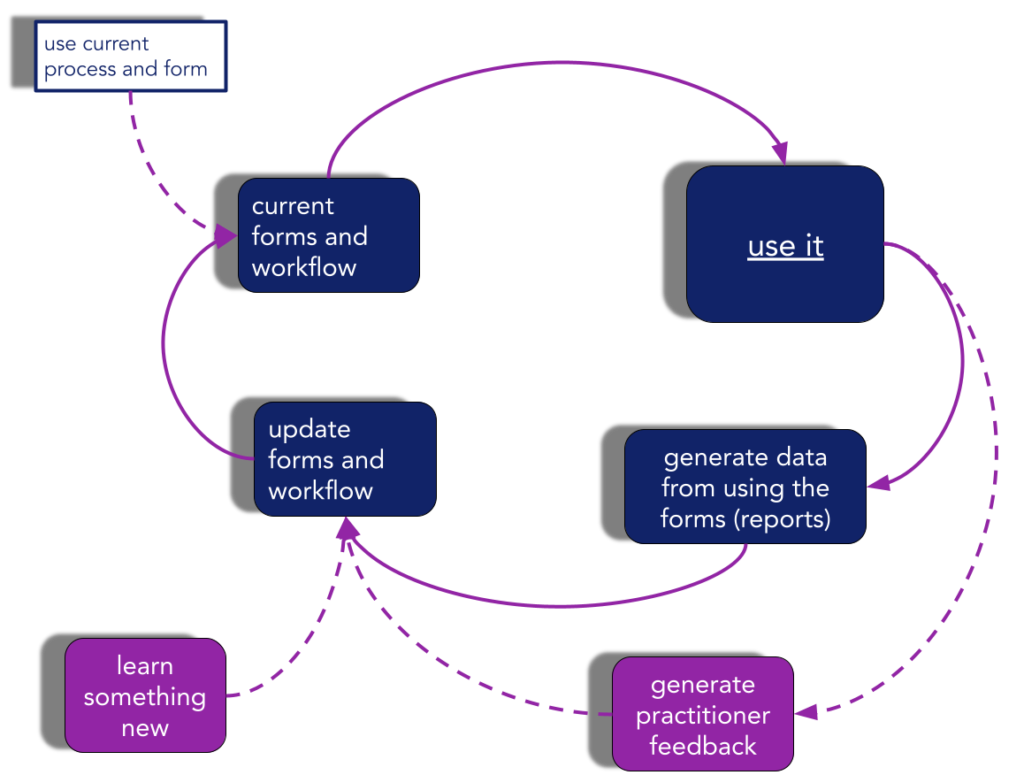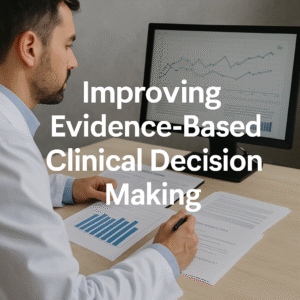Introduction: The Missing Link in Healthcare Optimization
In modern healthcare and service-based industries, evidence-based practice (EBP) has long been the gold standard. However, relying solely on research studies without structured clinical processes, institutional knowledge development, and data collection can limit real-world effectiveness. At Amptimum, we believe that true innovation in clinical and business settings comes from integrating structured workflows, quality data collection, and team collaboration.
This approach ensures repeatable, high-quality care while reducing inefficiencies and provider burnout. Let’s explore why a structured clinical process bridges the gap between research and real-world application and how data-driven decision-making improves outcomes.
Why Research Alone Isn’t Enough
Research studies provide critical insights into effective treatments and methodologies, but they often fail to account for the individuality of each patient or client and the importance of institutional knowledge within a practice.
Limitations of Research in Clinical Practice
- Population Averages vs. Individual Cases: The people walking into your clinic or business are not the “average” patient from a study—they have unique needs.
- Limited External Validity: A tightly controlled study with strict inclusion/exclusion criteria may not translate well into real-world settings.
- Lack of Granularity: Studies often miss nuanced insights into how factors like age, injury history, or behavioral traits affect outcomes.
The Missing Element: Institutional Knowledge Development
Beyond research, a major gap in many healthcare settings is the lack of institutional knowledge development—the structured process of capturing, refining, and integrating knowledge across a team. A well-defined clinical process ensures that critical insights aren’t lost when staff turnover occurs or when complex cases arise.
- Aggregates knowledge over time.
- Reduces training time for new staff.
- Fast-tracks professional development.
- Creates self-regulating standards of practice.
- Enhances patient management by supporting seamless transitions through your system.

The Solution: Clinical Processes That Adapt to Real People and Retain Institutional Knowledge
A well-structured clinical workflow and decision-making process allows practitioners to:
- Combine population-based research with real-time, patient-specific data.
- Adjust treatment based on live patient responses rather than rigid protocols.
- Ensure team-wide consistency while allowing for practitioner flexibility.
- Capture ongoing insights to refine practice over time.
- Build an institutional memory that strengthens a practice’s effectiveness over the long term.
By integrating quality data collection, clinicians can leverage analytics-driven decision-making to improve patient outcomes without relying solely on generalized research findings.
The Role of Data: Supporting Better Decisions in Real-Time
How Data Improves Decision-Making
Traditional research provides broad guidance, but data from your own practice can reveal real-time patterns and best practices that are directly applicable.
For example, if research says that a specific intervention works well for a condition, your own data can refine that further by identifying:
- Which subsets of patients respond better.
- The most effective timeline for results.
- How specific demographics affect treatment success.
- How institutional knowledge influences decision-making over time.
By tracking structured clinical metrics, patient responses, and workflow efficiencies, you can create a feedback loop for continuous improvement.
Reducing the Cognitive Load on Clinicians
Practitioners face decision fatigue from juggling patient care, documentation, and administrative tasks. A well-defined clinical process reduces effort by:
- Structuring how referrals, follow-ups, and documentation are handled.
- Organizing next steps so clinicians don’t need to rethink each action.
- Using predictive analytics to highlight potential patient risks.
- Ensuring knowledge gained through experience is systematically retained and shared.
This approach enhances clinical efficiency while reducing burnout.
Improving Team Interactions
Often, employees are just people who happen to work under the same roof, rather than truly collaborating to provide a unified service. Without structured processes, knowledge remains siloed, and team members miss out on opportunities to learn from one another.
A structured clinical system fosters knowledge-sharing, improving collaboration and ensuring the team operates as a cohesive unit rather than isolated individuals.

A building is not institutional knowledge. Effective clinical practice comes from developing the thinking tools and shared frameworks that allow teams to grow and improve over time.
How Amptimum Helps You Build a Smarter System
At Amptimum, we help healthcare providers and service-based businesses optimize their workflows, improve documentation, and use data to drive meaningful decisions.
Our Process Includes:
- Workflow Standardization: Defining and refining clinical and business processes.
- Structured Data Collection: Creating documentation that supports decision-making.
- Team Knowledge Integration: Ensuring staff share insights and improve collectively.
- Quality Improvement Systems: Regularly updating processes based on data-driven learnings.
- Institutional Knowledge Retention: Preventing knowledge loss through structured training and documentation.
By implementing structured clinical workflows and data-backed decision support, we help practices move beyond guesswork into precision-driven operations.
Conclusion: The Future of High-Performance Practices
Healthcare and service-based businesses are shifting towards precision-driven, efficient systems that leverage structured clinical processes, institutional knowledge, and real-time data.
By embracing this approach, organizations can:
- Improve patient and client outcomes.
- Reduce provider and staff workload.
- Increase operational efficiency and profitability.
- Ensure institutional knowledge is retained and leveraged effectively.
Are you ready to optimize your practice and take control of your workflows?
Let’s build a structured, data-driven system that works for you.


